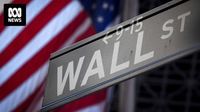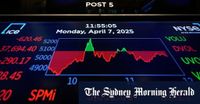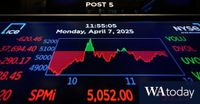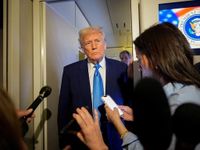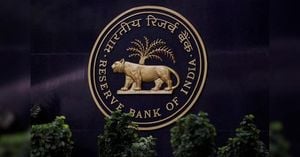US stocks experienced a wild ride on Monday, April 7, 2025, as President Donald Trump made headlines with his aggressive stance on tariffs, igniting fears of a potential recession. The S&P 500 index fell 0.2 percent, while the Dow Jones Industrial Average dropped 349 points, or 0.9 percent. In contrast, the tech-heavy Nasdaq composite managed a slight gain of 0.1 percent by the end of the day.
Markets opened sharply lower, reflecting a continuation of the turmoil that had characterized the previous week, which was the worst week for Wall Street since the onset of the COVID pandemic in March 2020. The S&P 500 was perilously close to entering a bear market, having fallen more than 20 percent from its all-time highs. The Dow, at one point, plunged by as much as 1,700 points before making a late-morning recovery.
Trading was dominated by concerns over Trump's escalating trade war, particularly his threats to impose an additional 50 percent tariff on imports from China if Beijing did not withdraw its retaliatory tariffs on US goods. The White House, however, dismissed rumors of a 90-day pause on tariffs, labeling them as "fake news." This dismissal sent stocks tumbling once again.
Trump, undeterred by the market's volatility, stated during an interview aboard Air Force One that he was not concerned about the sell-off, asserting, "Sometimes, you have to take medicine to fix something." His comments underscored a belief that the tariffs were necessary to address trade imbalances and bring jobs back to the United States.
In a press conference, Trump expressed optimism, saying, "Greatness will come if Americans are strong, courageous, and patient." He emphasized that negotiations with several countries were underway, indicating that he was open to fair trade deals. Trump noted, "We have many, many countries that are coming to negotiate deals with us, and they're going to be fair deals, and in certain cases, they're going to be paying substantial tariffs." This statement came after a "very good conversation" with Japanese Prime Minister Shigeru Ishiba and a meeting with Israeli Prime Minister Benjamin Netanyahu, who pledged to eliminate the trade deficit with the US.
Despite Trump's assurances, financial analysts are increasingly concerned about the potential for a recession, even if the president were to reverse his tariff policies. Goldman Sachs recently raised the odds of a US recession to 45 percent, citing factors such as tightening financial conditions and increased uncertainty surrounding trade policies. JPMorgan CEO Jamie Dimon echoed these sentiments in his annual letter to shareholders, stating, "The recent tariffs will likely increase inflation and are causing many to consider a greater probability of a recession."
Globally, markets reacted negatively to the prospect of Trump's tariffs. Stocks in Hong Kong plummeted by 13.2 percent, marking their worst day since 1997. Taiwan's TAIEX index dropped 9.7 percent, while Japan's Nikkei 225 fell by 7.83 percent. The Straits Times Index in Singapore tumbled more than 7 percent, and South Korea's KOSPI fell over 5 percent. Australia’s ASX 200 also closed down more than 4 percent, suffering a loss of $110 billion from its share market.
The chaos in the markets was further compounded by falling oil prices, with a barrel of benchmark US crude dipping below $60 for the first time since 2021. Bitcoin also took a hit, sinking below $78,000, down from its record of over $100,000 set in January.
Trump's tariffs have been framed as a necessary step to combat what he perceives as unfair trade practices by other countries. In a social media post, he highlighted the barriers faced by American beef producers in Australia, stating, "Australia has sold $29 billion worth of beef in the United States and we haven't been able to sell one hamburger in Australia." This sentiment was echoed by Wyoming Senator John Barrasso, who criticized trade restrictions in Thailand and Vietnam.
As the market turmoil continues, investors are left grappling with uncertainty. Many are holding onto hope that Trump may eventually lower tariffs after negotiations with other countries. However, the prospect of retaliatory tariffs from affected nations looms large, as analysts predict that the ongoing trade disputes will prolong market volatility.
Amidst this backdrop, Trump remains resolute in his approach. He has repeatedly stated that he will not back down unless other nations balance their trade with the US. The stakes are high, as the potential for a recession becomes ever more plausible. Lawrence Summers, a former US Treasury Secretary, remarked that the current situation could be one of the most damaging economic policies enacted by the US since World War II.
As the world watches closely, the ramifications of Trump's trade policies are likely to reverberate across global markets for the foreseeable future. Whether his administration can navigate these turbulent waters without tipping the economy into recession remains to be seen.
